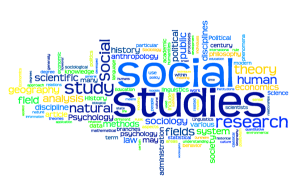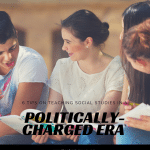 I don’t care which television news channel you select – I hate them all. Why? There are a variety of reasons. For one, they are all emotion, little fact. They focus on sound bites instead of the whole speech. They care way too much about celebrity and not about the common person. Most of all, they completely feel like they have to do the thinking for you.
I don’t care which television news channel you select – I hate them all. Why? There are a variety of reasons. For one, they are all emotion, little fact. They focus on sound bites instead of the whole speech. They care way too much about celebrity and not about the common person. Most of all, they completely feel like they have to do the thinking for you.
Teaching social studies can’t be the same as television news. We have to ensure that we are training students to question and comment on what is actually happening. Instead, we often rely on the textbook. It’s already chewed up the information and spit it out into a nice little tablet, filled with questions at the back and bolded vocab words at the front. It’s pretty nice, and I’m just as guilty as the next teacher.
That is until I take time to ensure that I have my students jump into the dirty mud of history by using primary sources. What is a primary source, you might ask? It’s anything that occurred during the time of study. Anything that comes from those who experienced the event. According to The Truman Presidential Library, they can be any written documents, sketches, photos, cartoons, maps, or interviews – among other things.
For example, what better way to examine an unanswered historical issue like the Boston Massacre than to fully dive head first into the primary documents in a mock trial? What our social studies textbook explains in 2 sentences, my students spend 2 weeks analyzing, preparing, and producing a full on trial of the Redcoats who fired into the 1770 Bostonian crowd. It’s the most incredible experience I’ve ever had in the classroom, and it’s all thanks to primary sources. (Sadly, due to copyright infringement and the book being out of print, I can’t post a link to the trial resources, but there is this link to use as well – http://teacherweb.com/il/woodlandmiddleschool/lakemacher/Boston-Massacre-Mock-Trial.pdf)
A bit of forewarning – primary sources are the antithesis of the textbook. There are no bolded words (unless the original author chose to make it that way). They are sometimes unreadable. Sometimes they’re in – GASP! – cursive, so you may have to translate for your students. This often isn’t something teachers can treat like the Ronco Rotisserie (maybe you don’t remember the “Set it and forget it!” commercials). Instead, it’s like cooking risotto. It takes a lot of time and attention, and sometimes you’re going to burn it a bit, but it’s almost always well worth it.
The Library of Congress says that we should use primary sources because they help engage the learner, help develop critical thinking, and construct knowledge, while the National Archives firmly believes that primary sources help portray “history in the raw.”
And that’s what we need to do – we need to take back our thinking in the classroom. Otherwise we’re just churning out the next FoxNews and MSNBC viewers whose opinions differ very little from the scepter the loudmouth hosts hold. We owe it to the future of our citizenry to get our students to think, analyze, and form their own judgments. It starts with primary sources.
Links for Primary Sources:
- American Library Association (ALA) – http://www.ala.org/rusa/sections/history/resources/pubs/usingprimarysources
- Austin Community College – http://www.austincc.edu/history/inres04prm.html
- Avalon Project (Yale College) – http://avalon.law.yale.edu/
- DocsTeach – http://docsteach.org/documents
- Eduplace – http://www.eduplace.com/ss/hmss/primary.html
- Eduplace (for kids) – http://www.eduplace.com/kids/socsci/nc/books/bke/sources/index.html
- Fordham University – http://www.fordham.edu/Halsall/mod/modsbookfull.asp
- HistoryTeacher.Net – http://www.historyteacher.net/APEuroCourse/APEuro_Main_Weblinks_Page.htm
- Life primary photos (hosted by Google) – http://images.google.com/hosted/life
- National Archives – http://www.archives.gov/education/research/primary-sources.html
- National History Day (US Sources) – http://www.nationalhistoryday.org/USHistoryPrimarySources.htm
- National History Day (World Sources) – http://www.nhd.org/WorldHistoryPrimarySources.htm
- Social Studies Central – http://www.socialstudiescentral.com/content/primary-sources
- Spartacus – http://spartacus-educational.com/






Leave a comment